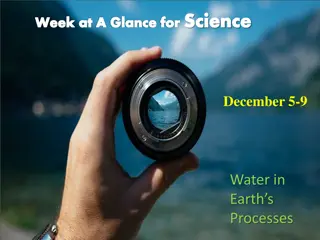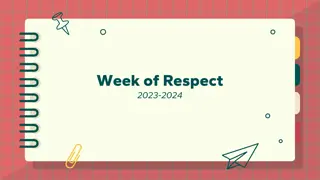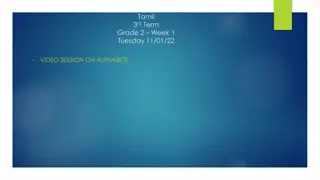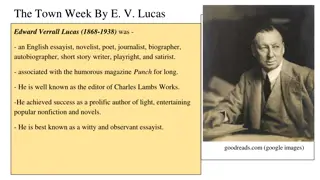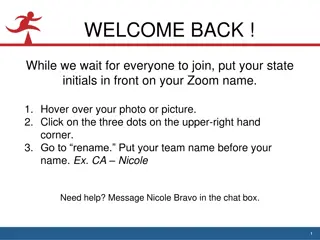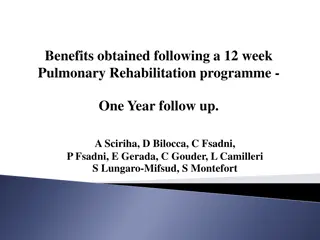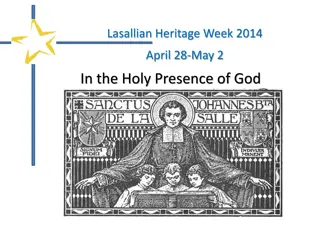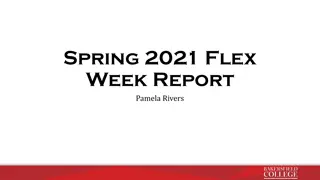
Understanding Humanities and Philosophy
Explore the world of Humanities and Philosophy through this comprehensive guide. Learn about classroom expectations, natural sciences, different types of degrees, and the significance of obtaining a PhD in various disciplines. Delve into the essence of Philosophy and its role in shaping our understanding of different disciplines. Discover the historical background, importance, and relevance of Humanities and Philosophy in today's academic realm.
Uploaded on | 0 Views
Download Presentation

Please find below an Image/Link to download the presentation.
The content on the website is provided AS IS for your information and personal use only. It may not be sold, licensed, or shared on other websites without obtaining consent from the author. If you encounter any issues during the download, it is possible that the publisher has removed the file from their server.
You are allowed to download the files provided on this website for personal or commercial use, subject to the condition that they are used lawfully. All files are the property of their respective owners.
The content on the website is provided AS IS for your information and personal use only. It may not be sold, licensed, or shared on other websites without obtaining consent from the author.
E N D
Presentation Transcript
Andrew Komasinski, PhD Hokkaido University of Education Asahikawa
ClassroomExpectations Come to class on time. Do not sleep in class. Ask questions if you do not understand. You are responsible to turn work in on time. Read assigned materials.
and Humanities = Science of = humanity and culture [ ] Humanities = things that relate to our human nature ( )
Natural Sciences and Humanities Natural Sciences Studies Natural World ( ) Foundation in Physics, Chemistry, Biology Uses data and experiments Humanities Studies the human world and condition Foundation in Philosophy, Culture, Literature Uses our reasoning and writing
Humanities:Background I In the West, universities gave roughly ( ) four different types of degrees ( ): JD Juris Doctorate = MD Medical Doctorate = ThD Doctor of Theology = PhD Doctor of Philosophy =
Humanities:Background II Question: What can you get a PhD in now? Answer: Chemistry, Physics, Sociology, Anthropology, Geography, Economics, History, Philosophy, English, Japanese, Linguistics, Science Education Question: Why?
Humanities: Background III Question: Why are most disciplines ( ) PhDs? Answer: Most disciplines came from philosophy at some point. But when the field becomes more specialized it gets its own area of study.
HumanitiesandPhilosophy Philosophy is what is left ( ) after other disciplines come into existence Philosophy also asks about different disciplines and what they mean What does it mean to do chemistry? What does it mean to think about geography? Is there right and wrong in economics?
OutlineofWeeks8-15 [12/4]: Overview of Humanities [12/4]: Overview of Philosophy [12/11 - 12/18]: Plato No Class 12/25 [1/8 - 1/15]: Aristotle [1/22 - 1/29]: Modern Philosophy 1/29 Report Due
RequirementsforWeeks8-15 From the syllabus s 1 2 2 Implementation ( ) = 1 Report
Reports:Details sent to me via e-mail: komasinski.andrew@a.hokkyodai.ac.jp 1 page A4 Grading: Length Content Is it really at least one page? Does it show you understood the lectures? Do you add any of your own thoughts? Does the content make sense? Insight Grammar
Reports:E-mail sent to me via e-mail: komasinski.andrew@a.hokkyodai.ac.jp Address me as Dr. K in the e-mail Include sentences at the top: I am Hiroshi Abe. I am a student in . My student number is c30000ah. I have attached my report.
Reports: Grammar andLanguage If you write your report in English, you can get full credit on the grammar even if it is not perfect or completely natural. If you write your report in Japanese, I can only give you a C on the grammar (since I cannot check it) If you write your report in French ( ), You can show me both languages.
WhoamI? Many of you have already taken classes from me. I was born in Indianapolis, IN I have a BS in Chemistry and Philosophy ( ) from Wheaton College near Chicago.
Graduate Work MA in Philosophy and PhD in Philosophy My specialization is moral selfhood ( ) I look at the way that relationships help us to know right and wrong and influence our behavior. My favorite philosopher is Soren Kierkegaard.
What thismeansforyou Every class with me is an intercultural experience ( ) I am not used to lecturing for 90 minutes I want to ask you questions I want to have you work in groups and discuss what I am saying I want to give you time to respond I do not want to transfer information. I want you to be grasp ( ) material on your own
OverviewofWestern Philosophy Western philosophy divides into roughly four periods: ANCIENT Philosophy MEDIEVAL Philosophy MODERN Philosophy CONTEMPORARY Philosophy ( ) ( ) ( ) ( )
ANCIENTPHILOSOPHY[<400CE] Pre-Socratics Thales, Anaximander, Heraclitus, Parmenides Socrates/Plato Aristotle Stoics / Epicureans / Academic Skeptics ( ) ( ) ( ) Key Questions: What exists? What kind of things are they? How do we gain knowledge? How should we live?
MEDIEVAL PHILOSOPHY[400CE-1400CE] Augustine ---- Ibn Sina [Avicenna] Albert Magnus Thomas Aquinas William Ockham John Buridan [354-430 CE] [980-1037 CE] [1200-1280 CE] [1225-1274 CE] [1287-1347 CE] [1300-1358 CE] Key Questions: What to do with science and God? How to understand the re-discovery of Aristotle?
MODERNPHILOSOPHY [1400CE-1900CE] KEY QUESTION: How can we know? What can we know? EARLY MODERNITY Rationalists ( ) Descartes, Leibniz, Spinoza Empiricists ( Locke, Berkeley, Hume LATE MODERNITY Kant, Hegel Kierkegaard, Nietzsche Bentham, Mill
CONTEMPORARY PHILOSOPHY[1900CE-NOW] ANALYTIC Philosophy- Wittgenstein, Quine, Vienna Circle = Solving problems using modern logic CONTINENTAL Philosophy- Adorno, Arendt, Heidegger, Sartre, Camus, Foucault, Derrida = Deconstructing [ ] Truth and Philosophy AMERICAN Philosophy = Pierce, Dewey, James, Rorty =Practical Philosophy [ ] COMPARATIVE Philosophy = studying Confucius, NISHIDA, Indian thought, etc. =Learning from Other
EASTERNTHOUGHTAND PHILOSOPHY In one sense, philosophy means Socrates and the people who come after him. His opponents ( ) were sophists. In another sense, philosophy means asking questions like: Where do things come from? What do we mean when we call things humans ? What should we do with our lives? Is it wrong to ? Must we .? In the second sense, people like Buddha, Jesus, and Confucius can be called philosophers.
MethodforClass Each class involves: A) Explaining cultural background of the material we are reading B) Looking at certain key ideas the philosopher develops C) Understanding the arguments the thinker makes
Readingfor 12/11 For the next class, please read Plato s Apology ( )


